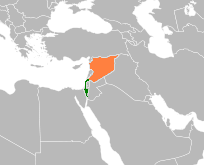| UN Security Council Resolution 35 | |
|---|---|
| Date | October 3 1947 |
| Meeting no. | 207 |
| Code | S/574 (Document) |
| Subject | The Indonesian question |
Voting summary | 9 voted for None voted against 2 abstained |
| Result | Adopted |
| Security Council composition | |
Permanent members | |
Non-permanent members | |
United Nations Security Council Resolution 35, adopted on October 3, 1947, asked that the Secretary-General convene and arrange the work schedule for the committee of three arranged for in United Nations Security Council Resolution 31 as soon as possible.

The United Nations (UN) is an intergovernmental organization that was tasked to maintain international peace and security, develop friendly relations among nations, achieve international co-operation and be a centre for harmonizing the actions of nations. The headquarters of the UN is in Manhattan, New York City, and is subject to extraterritoriality. Further main offices are situated in Geneva, Nairobi, and Vienna. The organization is financed by assessed and voluntary contributions from its member states. Its objectives include maintaining international peace and security, protecting human rights, delivering humanitarian aid, promoting sustainable development and upholding international law. The UN is the largest, most familiar, most internationally represented and most powerful intergovernmental organization in the world. In 24 October 1945, at the end of World War II, the organization was established with the aim of preventing future wars. At its founding, the UN had 51 member states; there are now 193. The UN is the successor of the ineffective League of Nations.

The Secretary-General of the United Nations is the head of the United Nations Secretariat, one of the six principal organs of the United Nations. The Secretary-General serves as the chief administrative officer of the United Nations. The role of the United Nations Secretariat, and of the Secretary-General in particular, is laid out by Chapter XV of the United Nations Charter.
United Nations Security Council Resolution 31, adopted on August 25, 1947, offered to assist in the peaceful resolution of the Indonesian National Revolution by setting up a committee of three members; one to be chosen by the Netherlands, one to be chosen by Indonesia and the third to be chosen by the other two members of the committee.
The resolution passed with nine votes in favour and two abstentions from Poland and the Soviet Union.

Poland, officially the Republic of Poland, is a country located in Central Europe. It is divided into 16 administrative subdivisions, covering an area of 312,696 square kilometres (120,733 sq mi), and has a largely temperate seasonal climate. With a population of approximately 38.5 million people, Poland is the sixth most populous member state of the European Union. Poland's capital and largest metropolis is Warsaw. Other major cities include Kraków, Łódź, Wrocław, Poznań, Gdańsk, and Szczecin.

The Soviet Union, officially the Union of Soviet Socialist Republics (USSR), was a socialist state in Eurasia that existed from 30 December 1922 to 26 December 1991. Nominally a union of multiple national Soviet republics, its government and economy were highly centralized. The country was a one-party state, governed by the Communist Party with Moscow as its capital in its largest republic, the Russian Soviet Federative Socialist Republic. Other major urban centres were Leningrad, Kiev, Minsk, Alma-Ata, and Novosibirsk. It spanned over 10,000 kilometres east to west across 11 time zones, and over 7,200 kilometres north to south. It had five climate zones: tundra, taiga, steppes, desert and mountains.






